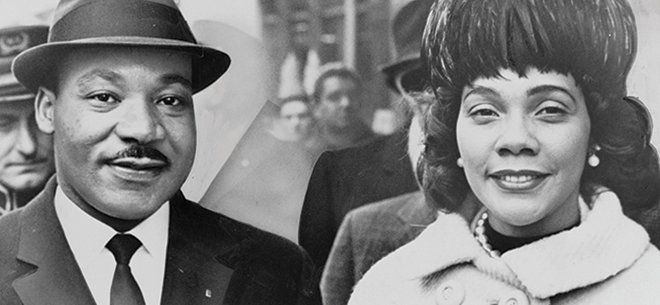
Although Martin Luther King, Jr., is more closely associated with his native Atlanta, Boston was instrumental in shaping the destiny of the iconic Civil Rights leader. While a graduate student studying theology at Boston University in the 1950s, he encountered people and ideas that would profoundly influence the course of his all-too-brief life.
When King came to B.U. in 1951, he was a young preacher seeking to further his education. When he had earned his Ph.D. in systematic theology in 1955, he was Dr. King, a man ready to make a difference in not just his home base in the segregated South, but in the country as a whole. During his time here, King met Howard Thurman, a teacher and minister whose first-hand accounts of meeting Mohandas Gandhi in India helped King solidify the roots of his non-violent form of civil disobedience. Another influence was an old friend of his father’s, Rev. William Hunter Hester of the historic Twelfth Baptist Church in Roxbury, who took on King as an assistant and helped him refine his preaching style by allowing him to minister to local youth. On a personal level, Boston was also significant, since it is where he met his future wife, Coretta Scott (pictured, above right), a fellow Southerner who was a singing student at the New England Conservatory at the same time King was at B.U. While living in the South End, King was also impressed by the strong black culture of nearby Roxbury as well as the neighborhood in which he took up residence, which hosted world-class jazz clubs where both black and white mixed. After his time at B.U., MLK returned to Boston for two more momentous events: in 1964, the year he won the Nobel Prize, he donated his papers to his alma mater; and, in 1965, he gave his first speech before a legislature at the Massachusetts State House, followed the next day by a 2.5-mile, 22,000-people-strong march from Roxbury to Boston Common that was a first for the Northeast.
For those looking to celebrate the life of Dr. King on the day named in his honor, there are several options available. The Museum of Fine Arts offers free admission, a variety of special activities and the Wilson/Cortor exhibit that houses a portrait of King by Roxbury native John Wilson (1922–2015). Also of note are two gatherings that pay tribute to King’s legacy: the country’s longest-running event dedicated to the memory of Dr. King, the ticketed 47th Annual Martin Luther King, Jr. Memorial Breakfast at the Boston Convention & Exhibition Center (415 Summer St., bostonmlkbreakfast.org) at 8 a.m.; and, at 1:30 p.m., the free, annual City of Boston and Museum of African American History MLK tribute at Faneuil Hall, which features an appearance by Mayor Marty Walsh and a performance by the Boston Youth Symphony Orchestra as well as an audience sing-a-long (maah.org/events.htm). Beyond that, history buffs can visit the Dr. Martin Luther King, Jr. Archive at B.U.’s Howard Gotlieb Archival Research Center (Mugar Memorial Library, 771 Commonwealth Ave., 617-353-3696, bu.edu/dbin/mlkjr/visitors) Monday through Friday from 9 a.m.–5 p.m. to see special displays highlighting select items from the collection.


